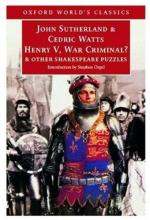|
This section contains 10,039 words (approx. 34 pages at 300 words per page) |

|
Janet M. Spencer, Wingate University
"The figure who exceeds the law as its master and the one who exceeds it as transgressor," Christopher Pye explains of Henry V and the traitors Cambridge, Grey, and Scroop, "are indeed bound by an unspoken—perhaps unspeakable—knowledge about the origins of power."1 In Shakespeare's Henry V, Henry takes great pains to conceal his capacity to exceed the law by seeking religious legitimation of, or by displacing moral responsibility for, decisions based ultimately on royal prerogative. And for a great number of producers, theatergoers, and literary critics he succeeds admirably.2 Nevertheless, his decisions to exercise royal power mark him as a figure of legal excess, an identity given specific significance by the "figures and comparisons" drawn between England's warrior-king and the celebrated conqueror whom Fluellen calls "Alexander the Pig."3 The play provides numerous explicit allusions to Alexander the Great, supporting Fluellen's assertion...
|
This section contains 10,039 words (approx. 34 pages at 300 words per page) |

|


